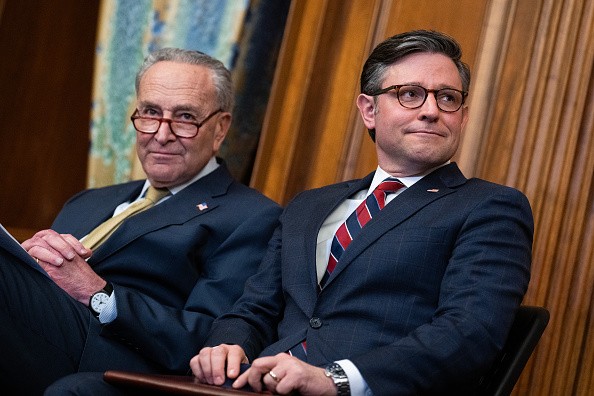The Associated Press reports that on Thursday the United States Senate voted to extend current federal spending to keep the government open, providing a short-term stopgap to the House that would avoid a government shutdown and push the creation of an actual budget package to March.

The stopgap measure passed the Senate 77-18. It comes after a bipartisan spending deal between Senate Majority Leader Chuck Schumer (D-NY) and House Speaker Mike Johnson (R-La) was agreed upon this month, and an agreement to extend current spending so that both chambers have sufficient time to pass the spending bills.
These measures will run through March 1 for many federal agencies whose funding approval was set to run out on Friday. The budgets for the remaining government operations will extend a week long to March 8. Johnson was facing pressure from the right to kill the budget agreement with Schumer.
What Happens Next?
The bill to keep the government running will need support from the left to pass the Republican-majority House. Johnson has asserted that he will stick with the plan as Republican moderates have urged him not to give in. This is the third time Congress has extended a current budget, and House Republicans have disagreed over budget levels. Some have demanded even larger cuts.
Former House Speaker Kevin McCarthy (R-Ca) pushed aside for striking an agreement with Democrats to extend the current budget back in October. Johnson seems to be struggling with how to appease members of his party and avoid a shutdown in an election year.
"We just needed a little more time on the calendar to do it and now that's where we are," Johnson said Tuesday about the decision to extend federal funding yet again. "We're not going to get everything we want."
Virginia Rep. Bob Good is one of eight Republicans who voted to oust McCarthy, has been urging Johnson to reconsider the deal with Schumer.
"If your opponent in negotiation knows that you fear the consequence of not reaching an agreement more than they fear the consequence of not reaching an agreement, you will lose every time," Good said this week.
The short-term fix comes amid talks on a separate spending package that would provide military support for Ukraine and Israel as well as strengthen security at the U.S.-Mexico border.
An Update
It was reported by the BBC that the House of Representatives swiftly approved a short-term funding measure, following the Senate's lead, despite prior political discord. With Democrats and Republicans initially at odds in budget talks, urgency heightened due to an impending Washington DC snowstorm and the looming deadline. The BBC went on to reveal that once endorsed by President Joe Biden, the $1.66 trillion legislation defers the government spending dispute to early March. The Senate passed the extension with a vote of 77 to 18, and the House followed suit with a vote of 314 to 108. Congressional leaders, defying demands for major spending cuts, reached consensus on the measure, devised by Republican House Speaker Mike Johnson, aiming to balance Democratic and hardliner interests.
© 2025 HNGN, All rights reserved. Do not reproduce without permission.








